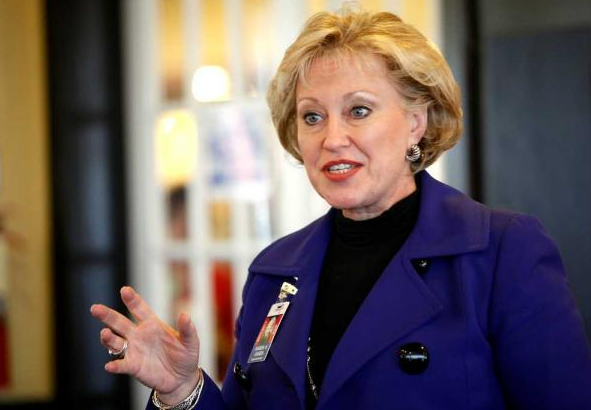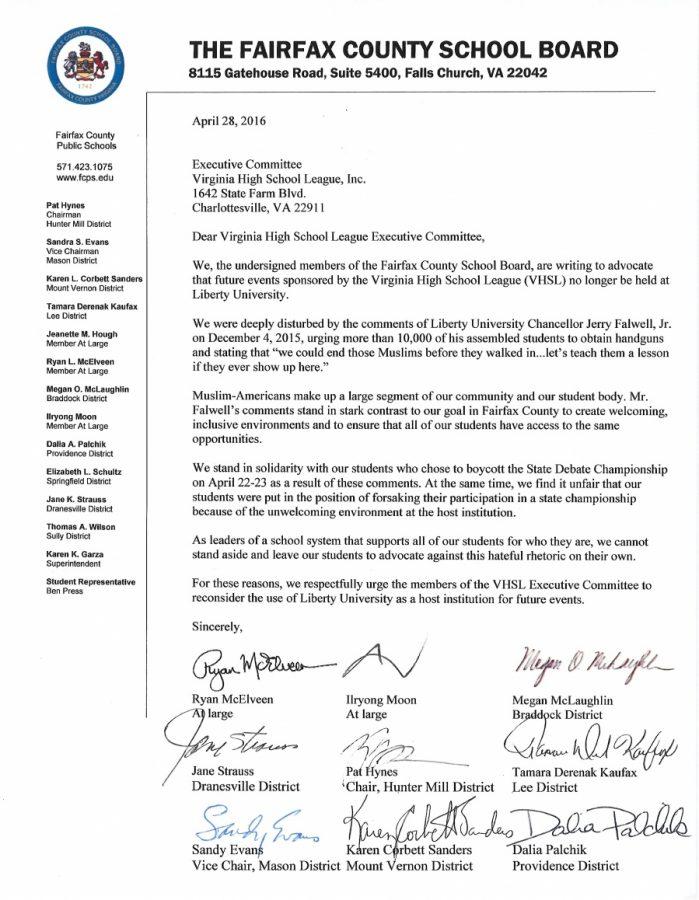Is there a possibility of a later start time for FCPS schools?
We have a group looking into this right now, and expect a recommendation from this committee in January to our school board on whether or not we change start times. There are a couple of things that we’ll have to consider.
Number 1: can we afford that change? There will be a fiscal amount that will be associated with that recommendation. During this time with the financial problems that we have, is now the time?
Number 2: if we want to do it, do we have to spend more time allowing groups that are affected but these changes to adjust? When we make any kind of adjustment we affect so many other things. For example, we have over 200 adult leagues that use our schools and there are limited facilities available so we need time to plan.
There have been recent rumors of extracurriculars being cut due to budget cuts. Are you planning on adjusting the budget so that these programs continue to be offered in FCPS schools?
We are facing a daunting projected deficit for fiscal year 15. It’s the largest deficit that this system has ever anticipated. You won’t see any [student programming] on the projected budget. Whatever the board adopts in May may look very different from what I propose in January, although I’m going to encourage that we do not cut any student programming.
I do intend to put a group together to look long term at our school system. I think we need to spend a lot more time looking at changes where we have students in the pipeline, so if down the road there are changes to student programming, we’ll get that done well in advance and be in a position to communicate those changes, and will be very thoughtful on how it affects students.
How will the budget affect larger schools compared to smaller?
If there are some changes to class sizes it’s kind of a matter of perspective. When you’re smaller, being cut or reduced will have a larger affect; percentage wise it’s a bout the same. Larger schools have a lot more resources available to them because they’re funded based on the number of students. In my estimation, while it affects everyone it will probably affect the smaller schools more than the larger schools because it’s felt more. We can’t address this deficit without affecting class sizes in some way because that’s where all of our money is. Most of our money is in schools, and most of our employees are teachers, so in order to reduce and economize and save money, we have to look at class sizes. If class sizes are of concern, talk to the board of supervisors because they’re the ones who determine how much money we get on an annual basis.
What do you think the causes of the deficit are?
We are experiencing for next year some uncontrollable cost increases that are totally outside of our control. One of those are growth; every year we grow about 3,000 students. There’s a cost to growth of about 25 million dollars to the system. We’ve had to rebid our health insurance program for our employees; that rebidding is driving up costs by another $27 million. We’re anticipating a decrease in state revenue for FCPS in approximately $21 million dollars less of state aid. Finally, we have to cover more of the Virginia retirement system for all of our employees. Right now we’re covering about 70% of the actual value of that system. We eventually have to cover 100% of the cost, gradually. Just going from 70-80% will cost us an additional $30 million dollars next year. Just those things alone are valued at about 110 million dollars.
How is FCPS trying to stay ahead of growing student population?
It’s very difficult for us to stay ahead. I’m continuing to visit with members of our board of supervisors about us collaboratively developing a long range financial plan so that it’s not every year we’re looking at where can we cut, where can we cut but to really be thoughtful on what the future looks like. Over the last 5 years the transfer increase has been on average about 1% yet during that same period of time we grew about 15000 students.
Our needs are far outpacing the revenue we’ve had available to us to meet those needs. So we’ve really been working hard behind the scenes with the board of supervisors trying to understand those constraints.
What are the advantages to the IB program for students who don’t plan on going to school over seas?
The international baccalaureate program is widely known across the country, not just overseas, as a rigorous program of studies very well regarded by colleges in the united states as well. I think it prepares students quite well. Now, its not for every student, so I do like to hope for the future that we offer AP at the same time for students that might not want to go through the diploma program. I think it’s a valuable program; its certainly well aligned with what were looking for in the needs of a 21st century graduate.
How does FCPS plan to move forward in regards to environmental sustainability?
I haven’t examined that a whole lot, although I do know that on the facility side we’ve been very concerned with measuring our carbon foot print, which is why we don’t tear down a lot of schools, we tend to renovate and expand because you do increase your carbon footprint when you tear down buildings and replace them. I’m not sure what we’re doing beyond that; it’s not something I’ve looked at in the four months I’ve been here, but that is something I need to look into.
If No child left behind was implemented correctly, do you think it would produce a workforce suitable for the 21st century economy?
NCLB from a policy perspective was well intended. Before NCLB many, many states had no way of measuring how well we were doing with all students. For that reason I think it was successful in that every state has a system that we can measure how we provide a high quality education for each child. However, just like a lot of accountability systems it’s gone way too far. We don’t have to test every student every year in order to hold the school system accountable. I think it was flawed in some ways. Was it designed to measure 21st century skills? No. I think it’s also quite challenging for a nation to have accountability systems when individual states have their own, so you have competing designs.








